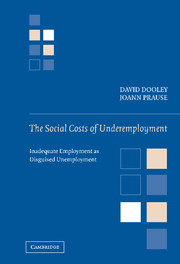Book contents
- Frontmatter
- Contents
- Preface
- 1 Disguised Unemployment and Changing Forms of Work
- 2 The Social Costs of Unemployment
- 3 Data Sources and Methods
- 4 Reverse Causation: Findings on the Selection Hypothesis
- 5 Leaving School: Self-esteem in an Unwelcoming Economy
- 6 Early Adulthood: Alcohol Misuse and Underemployment
- 7 Settling Down: Psychological Depression and Underemployment
- 8 Extending the Employment Continuum: Well-Being in Welfare Transitions
- 9 The Next Generation: Underemployment and Birthweight
- 10 Conclusions
- 11 New Directions
- Appendix A
- Appendix B
- References
- Name Index
- Subject Index
2 - The Social Costs of Unemployment
Published online by Cambridge University Press: 27 July 2009
- Frontmatter
- Contents
- Preface
- 1 Disguised Unemployment and Changing Forms of Work
- 2 The Social Costs of Unemployment
- 3 Data Sources and Methods
- 4 Reverse Causation: Findings on the Selection Hypothesis
- 5 Leaving School: Self-esteem in an Unwelcoming Economy
- 6 Early Adulthood: Alcohol Misuse and Underemployment
- 7 Settling Down: Psychological Depression and Underemployment
- 8 Extending the Employment Continuum: Well-Being in Welfare Transitions
- 9 The Next Generation: Underemployment and Birthweight
- 10 Conclusions
- 11 New Directions
- Appendix A
- Appendix B
- References
- Name Index
- Subject Index
Summary
Work is life, you know, and without it, there's nothing but fear and insecurity.
John Lennon quoted from BBC-TV, December 15, 1969, by Herzenberg et al., 1998, p. 21.INTRODUCTION
History
A century of research on the health effects of employment stress has focused largely on just one aspect of underemployment—job loss or unemployment. But this literature also provides a theoretical framework for understanding the health consequences of other forms of underemployment, such as inadequate employment. And it provides empirical guidelines for designing new research on these understudied forms of underemployment.
Durkheim's (1966) analysis of suicide, published in 1897, provided one of the earliest studies of economic stress and health. Durkheim suspected that one cause of suicide was anomie, the disorientation and alienation consequent on losing the supportive structure of social norms. He theorized that anomie increased during periods of great change, including economic turbulence. In contrast to the later focus on adverse employment change, Durkheim suspected that change per se, economic expansions as well as contractions, would increase anomie and, in turn, suicide. He offered empirical data showing an association between absolute economic change and suicide rates. This hypothesis received further attention from researchers using modern econometric methods, generating evidence both pro (Pierce, 1967) and con (Marshall & Hodge, 1981).
This sociological debate about the relative importance of absolute versus adverse economic change has a parallel in the psychological literature on the impacts of different kinds of life events.
- Type
- Chapter
- Information
- The Social Costs of UnderemploymentInadequate Employment as Disguised Unemployment, pp. 16 - 35Publisher: Cambridge University PressPrint publication year: 2003



